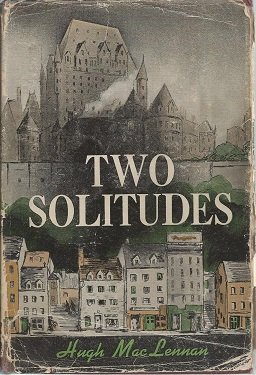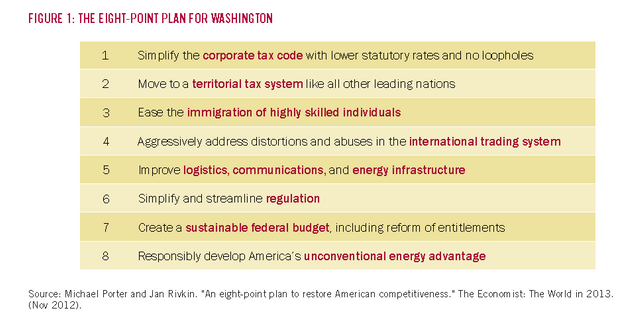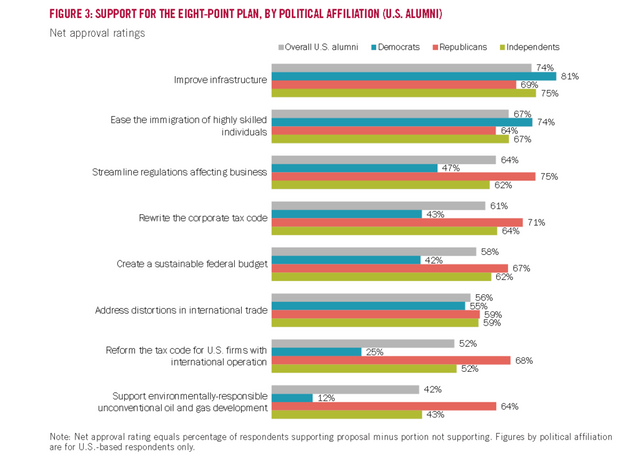[Economics/Politics] Two Solitudes: Harvard Economists Say Fixing U.S. Economy Is Easy; The Politics Are Not
Seminal Harvard B-School Study Presents Plan For Competitiveness and Growth, But Finds Political Divisions Block Solutions.

PROBLEMS UNSOLVED AND A NATION DIVIDED: The State of U.S. Competitiveness 2016: Including findings from Harvard Business School's 2016 surveys on U.S. competitiveness by Michael E. Porter, Jan W. Rivkin, Mihir A. Desai, With Manjari Raman (note: all figures taken from that report), is an excellent summary of the quandary the U.S. finds itself in today's competitive world. It is vexing that while there is general consensus on what needs to done, the authors demonstrate that politics stymies solutions.
A failing political system
• The U.S. political system was once the envy of many nations. Over the last two decades, however, it has become our greatest liability. Americans no longer trust their political leaders, and political polarization has increased dramatically. Americans are increasingly frustrated with the U.S. political system . . . Overall, we believe that dysfunction in America’s political system is now the single most important challenge to U.S. economic progress.
Of those who voiced an opinion, 65% of business leaders and 50% of the general public believe that the political system is obstructing U.S. economic growth and competitiveness.
They present an 8-point plan to modernize the U.S. economy:

They find 60 to 80% agreement with each of these proposals in their sample of HBS U.S. alumni and students. However, when they break approval down by political affiliation, a different picture emerges:

The HBS cohorts of Republicans, Independents and Overall all support each of the 8-proposals (except that Overall does not support point 8 regarding oil and gas development by 58% to 42%). Democrats on the other hand, oppose 5 of the 8 proposals. I think we've found the problem -- no need to wonder why Washington has become like two armed camps.
Note that these are HBS (i.e. business) students and alumni; the national Democrat party is substantially to the left of these guys. Trump is in vocal support of at least 7 of the 8 proposals (he might not support the second one dealing with H-1b visas.) (see also, Understanding Trump). Hillary's public position would be opposed to most of these proposals in the spirit in which they are offered.
Porter etal illustrate the increasing divisiveness in our society with this figure:

The center has not held, with increasing polarization between the R's and the D's. Note that in 1994, median America and the Democrats were in about the same place. By 2014, the gulf between left and right had grown dramatically and median America was a little closer to the right. For a discussion see Left Turn.
This reminds me of The Two Solitudes:
In 1945, Hugh MacLennan wrote a novel set in Montreal whose title came to sum up the relationship between the English and the French in Canada: “Two Solitudes”. They live in the same nation, sometimes in the same town, sometimes share the same workspace. But they inhabit different psychologies. In 2008, David Warren, a columnist with the Ottawa Citizen, argued that the concept has headed south:
In the United States, especially in the present election, we get glimpses of two political solitudes that have been created not by any plausible socio-economic division within society, nor by any deep division between different ethnic tribes, but tautologically by the notion of ‘two solitudes” itself. The nation is divided, roughly half and half, between people who instinctively resent the Nanny State, and those who instinctively long for its ministrations.
Mark Steyn in his book “After America”
Like the Eloi and the Morlocks in H.G. Wells "The Time Machine", the U.S. appears to be dividing into at least two separate groups that don't share much beyond sports. Ask a person where they stand on one issue (and it doesn't have to be a political issue) and you've got a pretty good read on where they stand ideologically.
Two solitudes indeed.